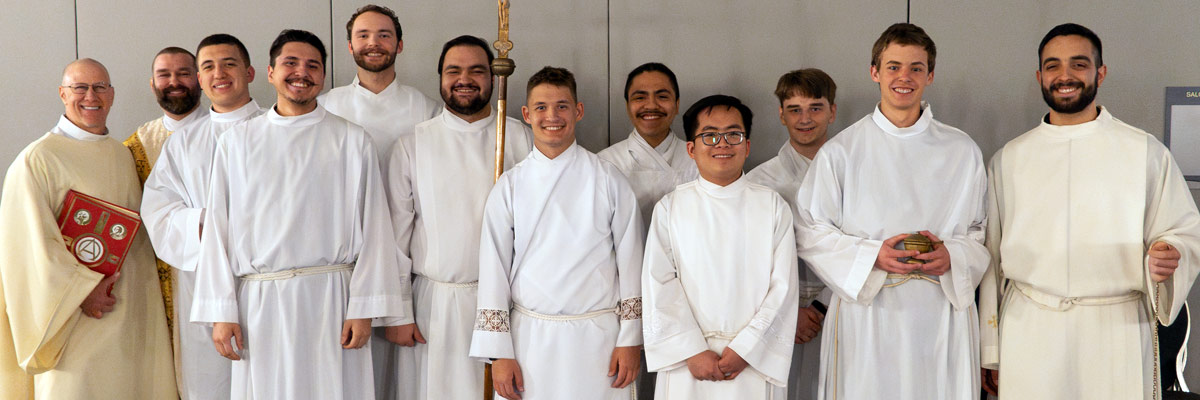Official Website of the
Catholic Diocese of Little Rock
Diaconate Ordination of William Burmester
Published: June 2, 2016
Bishop Anthony B. Taylor preached the following homily at St. Joseph Church in Conway on Thursday, June 2, 2016. It is based on the following readings: Jeremiah 1:1,4-10; Psalm 25; 2 Timothy 2:8-15; and Mark 12:28-34.

Bishop Taylor
Will, one of the biggest misconceptions people have about the teaching of Jesus has to do with his commandment of love in the Gospel, which you chose for your ordination today.
When Jesus was asked, “What is the greatest commandment of the law,” he said that the answer was to love God with all our heart, mind and soul, and our neighbor as ourself.
People have two major misconceptions about this teaching of Jesus. First, they act like this was a new teaching, an advance over the religious understanding that prevailed prior to Jesus. Quite the contrary.
The obedience you promise today is not just the mere compliance of a slave. It is the self-sacrificing gift of yourself to the Lord, and so you promise not only to do what I ask you to do, but also to do so with a listening, loving heart.
The question was about the greatest commandment of the “law” meaning the Torah, the first five books of the Old Testament. And so Jesus answers by quoting Deuteronomy regarding love of God and Leviticus regarding love of neighbor. Nothing new here, at least not for a Jew.
Second, people act like this is the greatest commandment there is, which it isn’t. It’s the greatest commandment “of the law.” The greatest commandment of the Old Testament.
Later, in the Gospel of John, Jesus gives us an even greater commandment when he says, “This is my commandment: love one another as I have loved you.” And how has he loved us? By laying down his very life for us. As Jesus says, “There is no greater love than this: to lay down one’s life for one’s friends.”
That’s a lot more than just loving others as we love ourselves, which in some cases may not even be very much — people who don’t love themselves have a hard time loving others.
And so Jesus raises the bar: How has Jesus loved us? Totally, sacrificially, to the death. And so that’s how we are to love one another.
Will, you stand before us today eager to commit yourself to a life of sacrificial love, to the death. In offering Jesus your sexuality by promising celibacy, you sacrifice many good things, not only sexual pleasure and physical closeness to a wife, but also having children, having a family of your own.
You embrace a life that can be lonely at times. It is true that you become part of a much bigger family and have access to far deeper levels of spiritual intimacy with more people than would ever be possible without the clear sexual boundaries that celibacy protects — many blessings, to be sure — but a big sacrifice nonetheless and not without temptations to be faced and overcome, as all these priests present can certainly attest.
For many, however, the bigger sacrifice is the promise of obedience, which involves the sacrifice of our will. Obedience is more than just compliance, going wherever I send you.
It is also a special kind of listening — from the Latin, ob-audire. Obedience is what goes on inside your heart; compliance by itself is just external behavior. Jesus didn’t just keep his father’s commandments, he also “lives in his love” and invites us to do the same, listening with a loving heart, which is why he calls us friends rather than slaves.
It is significant that the Old Testament word for “believer” really means “slave” — they used to belong to Pharaoh, now they belong to God.
So it is striking that when in the New Testament the Church established the order of deacons, we didn’t call those ordained for this service douloi (slaves) but rather diakonoi (servants), hence deacons, because the obedience you promise today is not just the mere compliance of a slave.
It is the self-sacrificing gift of yourself to the Lord, and so you promise not only to do what I ask you to do, but also to do so with a listening, loving heart.
And so we gather today to formalize your response to the call of Jesus and his Church, committing yourself to a life of sacrificial love — loving others as Jesus has loved you.




